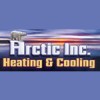
Heating, Air Conditioning, and Plumbing needs in the Ionia, Kent, Clinton, Montcalm, and Barry Counties. If you need plumbing expertise, Home Experts' Master Plumber and Team have got you covered! Call or send us a message today! A traditional air conditioner isn't always the best fit. In older homes-which lack the space needed ductwork-they might not even be an option.
Fortunately, Home Experts Heating, Cooling & Plumbing has an alternative: ductless mini-splits. These less popular systems have two parts. First is the ductless heat pump. Usually located outdoors, it looks a lot like an AC condenser. Inside the house are small cartridge-like devices called air handlers that circulate the air. Unlike ACs, mini-splits can both heat and cool your home.
Coming in at between 22 and 24 decibels, ductless systems are often praised for being whisper quiet. Because the air handlers have separate controls, they make zoning your home easy. Too hot in your living room? Just adjust the thermostat of the unit above the couch.
Fortunately, Home Experts Heating, Cooling & Plumbing has an alternative: ductless mini-splits. These less popular systems have two parts. First is the ductless heat pump. Usually located outdoors, it looks a lot like an AC condenser. Inside the house are small cartridge-like devices called air handlers that circulate the air. Unlike ACs, mini-splits can both heat and cool your home.
Coming in at between 22 and 24 decibels, ductless systems are often praised for being whisper quiet. Because the air handlers have separate controls, they make zoning your home easy. Too hot in your living room? Just adjust the thermostat of the unit above the couch.
Services
Appliance Service Plans
Report
Many utility companies offer home appliance service plans that provide repair coverage on furnaces, central air conditioners, water heaters, clothes washers and dryers, range/ovens, and many other home appliances.
Under these types of plans, the customer pays the company a yearly fee and the company agrees to repair any appliances covered under the plan.
In the event of a covered repair, customers are not charged for parts, labor, or a service trip.
However, as with any maintenance or service plan, you should read the fine print carefully to make sure you understand the costs, terms, and limitations of these plans.
Under these types of plans, the customer pays the company a yearly fee and the company agrees to repair any appliances covered under the plan.
In the event of a covered repair, customers are not charged for parts, labor, or a service trip.
However, as with any maintenance or service plan, you should read the fine print carefully to make sure you understand the costs, terms, and limitations of these plans.
Heating and Cooling Energy Tips
Report
Heating and cooling your home uses more energy and drains more energy dollars than any other system in your home.
Typically, 44% of your utility bill goes for heating and cooling.
No matter what kind of heating, ventilation and air-conditioning system you have in your house, you can save money and increase comfort by properly maintaining and upgrading your equipment.
Remember, though, an energy efficient furnace or air-conditioner alone will not have as great an impact on your energy bills as using the whole house approach.
Typically, 44% of your utility bill goes for heating and cooling.
No matter what kind of heating, ventilation and air-conditioning system you have in your house, you can save money and increase comfort by properly maintaining and upgrading your equipment.
Remember, though, an energy efficient furnace or air-conditioner alone will not have as great an impact on your energy bills as using the whole house approach.
How BTUs and EERs Work
Report
Most air conditioners have their capacity rated in BTUs, or British Thermal Units.
A BTU is, generally, the amount of heat required to raise the temperature of one pound of water one degree F. Specifically, a BTU is 1,055 joules, but the first definition is easier to understand in real-life terms.
One "ton", in heating and cooling terms, is 12,000 BTUs.
A typical window air conditioner that you find at a local retailer might be rated at 10,000 BTUs.
What that means is that the air conditioner has the ability to cool 10,000 pounds of water (about 1,200 gallons) one degree in one hour.
A BTU is, generally, the amount of heat required to raise the temperature of one pound of water one degree F. Specifically, a BTU is 1,055 joules, but the first definition is easier to understand in real-life terms.
One "ton", in heating and cooling terms, is 12,000 BTUs.
A typical window air conditioner that you find at a local retailer might be rated at 10,000 BTUs.
What that means is that the air conditioner has the ability to cool 10,000 pounds of water (about 1,200 gallons) one degree in one hour.
Keeping Your Equipment Tuned
Report
Just like your favorite car, your heating and cooling system needs a regular trip to the mechanic to keep it purring.
Without regular servicing, heating and cooling systems burn more fuel and are more likely to break down.
With the proper attention, they can keep you comfortable year-round.
Heat pumps and oil-fired furnaces and boilers need a yearly professional tune-up.
Gas-fired equipment burns cleaner; it should be serviced every other year.
A close inspection will uncover leaks, soot, rust, rot, corroded electrical contacts, and frayed wires.
Without regular servicing, heating and cooling systems burn more fuel and are more likely to break down.
With the proper attention, they can keep you comfortable year-round.
Heat pumps and oil-fired furnaces and boilers need a yearly professional tune-up.
Gas-fired equipment burns cleaner; it should be serviced every other year.
A close inspection will uncover leaks, soot, rust, rot, corroded electrical contacts, and frayed wires.
Safety Tips for Natural Gas
Report
Keep gas ranges clean, make sure burner bowls are free of used matches, grease, paper, etc.
Keep the pilot lights of your gas range lit.
If you put them out to save energy, a dangerous gas build-up can occur if someone accidentally turns on the range.
Never use your gas range to heat your home or apartment.
This practice creates a serious fire hazard and puts you and your family at risk from dangerous carbon monoxide fumes.
Do not look for the source of the smell with any open flame (even using a flashlight could be dangerous).
Keep the pilot lights of your gas range lit.
If you put them out to save energy, a dangerous gas build-up can occur if someone accidentally turns on the range.
Never use your gas range to heat your home or apartment.
This practice creates a serious fire hazard and puts you and your family at risk from dangerous carbon monoxide fumes.
Do not look for the source of the smell with any open flame (even using a flashlight could be dangerous).
Reviews

Be the first to review Sunroomsbykurt.com.
Write a Review


